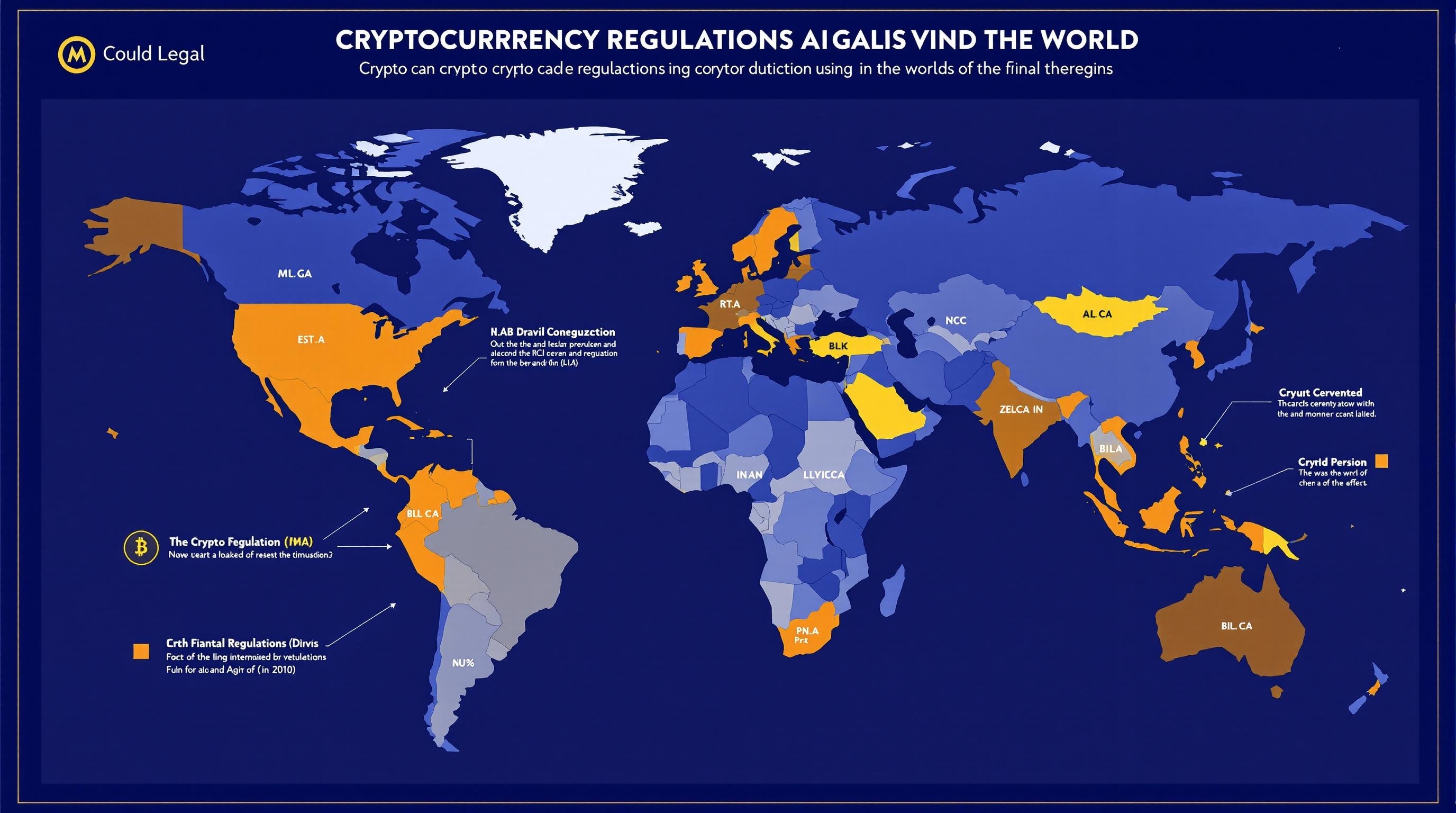
The world of cryptocurrency regulations is changing faster than ever! 🚀 As digital assets continue to reshape the global financial landscape, governments worldwide are scrambling to create frameworks that protect investors while fostering innovation. Whether you’re a crypto enthusiast, trader, or someone curious about Bitcoin and blockchain safety, understanding international crypto laws is crucial for your financial success.
In this comprehensive guide, we’ll explore how different countries approach cryptocurrency regulation, what it means for your investments, and how to stay compliant while maximizing your crypto opportunities. Let’s dive into this exciting regulatory landscape! 💰
Table of Contents
📊 The Global Crypto Regulations Landscape: A Bird’s Eye View
The cryptocurrency regulatory environment varies dramatically across the globe. According to recent research, among 75 major economies studied:
- 🟢 45 countries have made crypto legal
- 🟡 20 countries have partial bans or restrictions
- 🔴 10 countries have complete bans
This creates a complex patchwork of rules that crypto users must navigate carefully. The regulatory approach often depends on each country’s economic priorities, financial stability concerns, and innovation goals.
🇺🇸 United States: Leading the Regulatory Charge
Current Status: Evolving Framework 📈
The United States has taken a multi-agency approach to crypto regulation, creating both opportunities and challenges for users. Here’s what you need to know:
Key Regulatory Bodies:
- 🏛️ SEC (Securities and Exchange Commission): Oversees crypto securities
- 🏦 CFTC (Commodity Futures Trading Commission): Regulates crypto derivatives
- 💵 FinCEN: Handles anti-money laundering requirements
- 🏪 State regulators: Manage licensing and consumer protection
Major Developments:
- The FIT21 Act (Financial Innovation and Technology for the 21st Century Act) passed the House in 2024
- Growing clarity on stablecoin regulations through the GENIUS Act
- Increased focus on AML compliance and KYC requirements
What This Means for You:
- ✅ Legal to own and trade cryptocurrencies
- ⚠️ Must report crypto gains on taxes
- 🔒 Choose regulated exchanges for better protection
- 📋 Keep detailed records of all transactions
🇪🇺 European Union: MiCA – The Game Changer
The Markets in Crypto-Assets Regulation 🎯
Europe has emerged as a leader in crypto regulation with MiCA (Markets in Crypto-Assets), which provides comprehensive rules across all 27 EU member states.
Key MiCA Features:
- 🛡️ Consumer protection measures
- 🏢 Licensing requirements for crypto service providers
- 📊 Transparency and disclosure obligations
- 🌱 Environmental sustainability requirements
Country Highlights:
🇩🇪 Germany:
- Crypto treated as private money
- Tax-free after one year of holding
- Strong framework for institutional adoption
🇫🇷 France:
- Progressive “PSAN” licensing regime
- Clear tax guidelines
- Growing fintech hub
🇨🇭 Switzerland:
- Crypto Valley in Zug
- Banking-friendly crypto regulations
- Clear legal framework for digital assets
🌏 Asia-Pacific: A Mixed Regional Approach
🇯🇵 Japan: The Crypto Pioneer
Japan was one of the first major economies to embrace cryptocurrency regulation:
- ✅ Legal tender status for Bitcoin since 2017
- 🏪 Licensed exchanges under FSA oversight
- 💰 Tax clarity on crypto transactions
- 🔒 Strong consumer protection measures
🇸🇬 Singapore: The Balanced Approach
Singapore has created a crypto-friendly yet well-regulated environment:
- 🏛️ MAS (Monetary Authority of Singapore) oversight
- 📋 Payment Services Act covers crypto services
- 🎯 Innovation-focused regulatory sandbox
- 💼 Clear guidelines for institutional investors
🇰🇷 South Korea: Strict but Fair
South Korea maintains a cautious but evolving stance:
- 🏦 Banking integration allowed with compliance
- 📊 Real-name verification requirements
- 💰 20% tax on crypto gains above $2,000
- 🔒 Strong AML/KYC enforcement
🇨🇳 China: The Complete Ban
China maintains one of the world’s strictest crypto policies:
- ❌ Complete ban on crypto trading
- 🚫 Mining prohibition
- 💱 Digital Yuan (CBDC) as the only approved digital currency
- ⚖️ Legal penalties for crypto activities
🇮🇳 India: The Evolving Stance
India’s crypto regulation continues to develop:
- 🏛️ 30% tax on crypto profits
- 📋 1% TDS on crypto transactions
- ⚖️ Legal but regulated status
- 🎯 CBDC trials underway
🌍 Middle East & Africa: Emerging Opportunities
🇦🇪 United Arab Emirates: The Crypto Hub
The UAE has positioned itself as a global crypto destination:
- 🏙️ Dubai as a crypto-friendly jurisdiction
- 📋 Clear licensing frameworks
- 💼 Tax benefits for crypto businesses
- 🤝 Government backing for innovation
🇸🇦 Saudi Arabia: Cautious Progress
Saudi Arabia is gradually warming to crypto:
- 🏦 Central bank exploring CBDCs
- 📊 Regulatory framework under development
- 💰 Investment in blockchain projects
- ⚠️ Current restrictions on retail trading
🇿🇦 South Africa: Regulatory Clarity Coming
South Africa is working towards comprehensive crypto regulation:
- 📋 Financial Intelligence Centre Act applies to crypto
- 🏦 SARB developing policy framework
- 💼 Growing adoption in financial services
- 📈 Tax guidelines established
🌎 Latin America: Bitcoin Adoption Leaders
🇸🇻 El Salvador: The Bitcoin Country
El Salvador made history by adopting Bitcoin as legal tender:
- 💰 Bitcoin legal tender since 2021
- 🏛️ Government Bitcoin purchases
- 📱 Chivo wallet for citizens
- 🎯 Mixed results in adoption
🇲🇽 Mexico: Cautious Approach
Mexico maintains a restrictive stance:
- 🏦 Banks prohibited from crypto services
- 📋 Fintech law covers crypto regulations
- ⚖️ Legal but limited framework
- 💰 Tax obligations apply
🇧🇷 Brazil: Growing Acceptance
Brazil is becoming increasingly crypto-friendly:
- 📊 Comprehensive regulation passed in 2022
- 🏦 Central bank oversight
- 💰 Tax framework established
- 📈 Growing institutional adoption
🚨 Key Regulatory Trends to Watch in 2025
1. Stablecoin Regulations 💱
- Global focus on stablecoin backing requirements
- Reserve transparency mandates
- Cross-border payment applications
2. Environmental Compliance 🌱
- Energy efficiency requirements for mining
- Carbon footprint reporting
- Sustainable blockchain initiatives
3. DeFi Regulation 🔗
- Decentralized finance oversight
- Smart contract legal frameworks
- Liquidity pool regulations
4. CBDC Development 🏛️
- Central bank digital currencies launching globally
- Privacy vs. surveillance balance
- Financial inclusion goals
5. Cross-Border Harmonization 🌐
- International cooperation on standards
- FATF travel rule implementation
- Regulatory arbitrage reduction
💡 How to Navigate Crypto Regulations Successfully
👉 Start your crypto journey with Binance today — unlock exclusive rewards and trade securely with the world’s largest exchange. Join via referral and get up to $100 bonus →
✅ Best Practices for Crypto Users
1. Stay Informed 📚
- Follow regulatory updates in your jurisdiction
- Subscribe to official government announcements
- Join reputable crypto news sources
2. Choose Compliant Platforms 🏪
- Use licensed exchanges in your country
- Verify platform regulatory status
- Check insurance coverage and security measures
3. Maintain Proper Records 📋
- Keep detailed transaction histories
- Document all crypto activities
- Use crypto tax software for compliance
4. Understand Tax Obligations 💰
- Learn your country’s crypto tax rules
- Report gains and losses accurately
- Consider professional tax advice
5. Prioritize Security 🔒
- Use hardware wallets for storage
- Enable two-factor authentication
- Be aware of crypto scams and phishing attacks
🚀 The Future of Crypto Regulation
The regulatory landscape for cryptocurrencies will continue evolving rapidly. Key factors shaping the future include:
- 💼 Institutional adoption driving clearer frameworks
- 🏛️ Government CBDC rollouts
- 🌐 International coordination efforts
- 🛡️ Consumer protection enhancements
- ⚡ Technological innovations requiring new rules
🎯 Regional Opportunities for 2025
Best Crypto-Friendly Jurisdictions:
- 🇸🇬 Singapore – Balanced regulation and innovation
- 🇨🇭 Switzerland – Banking integration and clarity
- 🇦🇪 UAE – Tax benefits and government support
- 🇵🇹 Portugal – Tax-friendly environment
- 🇪🇪 Estonia – Digital-first approach
Emerging Markets to Watch:
- 🇮🇳 India – Large market with evolving rules
- 🇧🇷 Brazil – Growing Latin American hub
- 🇳🇬 Nigeria – High crypto adoption rates
- 🇹🇭 Thailand – Progressive Southeast Asian approach
🔍 Key Takeaways for Crypto Investors
🎯 Remember These Critical Points:
- Regulations vary significantly by country and can change quickly
- Compliance is essential for long-term success and security
- Choose regulated platforms for better protection
- Tax obligations apply in most jurisdictions
- Stay updated on regulatory changes in your area
- Professional advice can be valuable for complex situations
📈 Building Your Crypto Strategy
As the regulatory landscape continues to mature, successful crypto participants will be those who:
- 🧠 Stay educated about legal requirements
- 🏛️ Work with compliant service providers
- 📊 Maintain proper documentation
- 🔒 Prioritize security and blockchain safety
- 🌐 Understand global regulatory trends’
👉 Want to see how regulations affect the market? Read Crypto Market Rally: Bitcoin Hits $160K While Altcoins Surge for insights on price reactions to global policies.
The world of cryptocurrency regulation is complex but navigable. By staying informed, choosing reputable platforms, and maintaining compliance with local laws, you can participate safely in the exciting world of digital assets while avoiding rug pulls and maximizing your opportunities in this revolutionary financial landscape.
Please note:–
CryptoView.live may contain links to third-party websites or external resources purely for informational purposes. We do not control or endorse the content, accuracy, or offerings of any third-party site linked within our platform. Visitors are strongly encouraged to conduct their own research before engaging with any services or content mentioned. The views expressed on CryptoView.live do not constitute financial advice and reflect the opinions of the authors, not necessarily those of the platform itself.
Disclaimer:
Please note that I am a human and human can make mistakes and this information is for educational purposes only. Nothing in this article should be considered financial or investment advice. Cryptocurrencies are volatile and involve substantial risk of loss. Always do your own research before making any investment decisions. Consult with a qualified financial advisor for personalized guidance.
Why are crypto regulations important in 2025?
They define how individuals and businesses can use crypto legally, prevent fraud, and attract institutional investment.
Which countries have the most favorable crypto regulations in 2025?
Countries like Singapore, Switzerland, and the UAE lead with crypto-friendly laws, clear tax rules, and innovation zones.
Where is crypto banned or restricted in 2025?
Nations like China, Algeria, and parts of South America still enforce strict bans or limit crypto use to government-controlled platforms.
What is KYC and AML in crypto regulations?
KYC (Know Your Customer) and AML (Anti-Money Laundering) rules require identity verification to prevent illegal transactions and improve compliance.
How do global crypto regulations affect DeFi and NFTs?
DeFi projects and NFT platforms must now meet new licensing, tax, and reporting standards in many jurisdictions.













u9r1bj
uz7a9m
У вас есть потрясающе материал правильно.
Посетите также мою страничку Как выбрать
гостевые дома посуточно https://tiktur.store/
MK